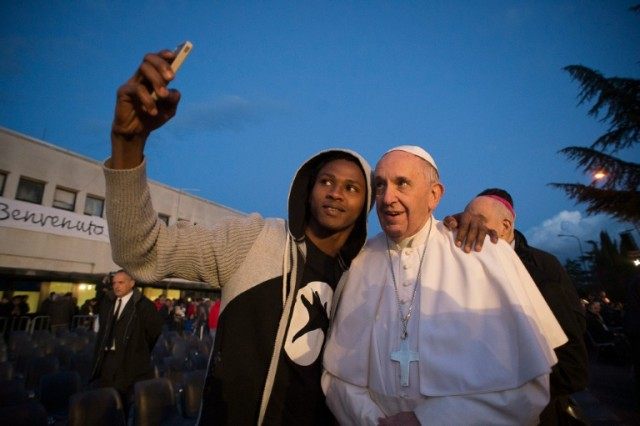Vatican City (AFP) – Pope Francis was urged Thursday to speak out against the European Union’s deal to send migrants back to Turkey when he visits Lesbos, the Greek island on the frontline of the crisis.
Francis is due on the island on Saturday to see for himself how it is coping with a mass influx of asylum seekers arriving by boat from Turkey.
His five-hour stay will include a visit to a centre for processing asylum seekers which rights groups says has become a detention facility under the terms of a controversial EU-Turkey accord that came into force last month.
Brussels hopes the deal will stem the flood of people seeking entry to Europe via the Greek islands, many of whom are fleeing the five-year conflict in Syria.
Amnesty International said the papal visit was an opportunity to highlight the plight of those “arbitrarily detained” in the Moria centre, which is currently housing around 2,500 people.
“He must also speak out about the violations, fear and uncertainty suffered by thousands of refugees and migrants trapped in limbo on Lesbos and elsewhere in Greece,” said Amnesty’s Gauri van Gulik.
“The pope should make clear that failure to change course would be Europe’s shame.”
– ‘Humanitarian not political’ –
A Vatican spokesman would not be drawn on whether the timing of the pope’s visit was designed to highlight concern over EU policy.
“It is not for me to make interpretations. If the pope has something to say he will say it,” Father Federico Lombardi told reporters, while stressing the purpose of the trip was “strictly humanitarian and ecumenical not political”.
Francis, who has made the plight of people fleeing poverty and conflict one of the central themes of his papacy, is flying to Lesbos on the invitation of Orthodox patriarch Bartholomew I.
During his visit to Moria, he will meet with and have lunch with a handful of asylum seekers in one of the adapted containers used to accommodate them. That will be followed with a larger meeting with around 250 migrants, Lombardi said.
The pontiff will also meet Greek coastguards and local residents before heading back to Rome.
– ‘A symbol of hope’ –
The trip to Lesbos follows an equally symbolic 2013 trip by the Argentinian pontiff to Lampedusa, the Italian island which has witnessed several deadly sinkings of migrant boats off its shores.
There, Francis made one of his most famous speeches, railing against the “globalisation of indifference” which has allowed thousands to perish at sea in their pursuit of a better life for themselves and their families.
It is a theme he has returned to repeatedly, notably by urging every Catholic parish in Europe to find accommodation for at least one migrant family. The Vatican is currently hosting two families seeking asylum in Italy.
Over one million people crossed clandestinely from Turkey to Greece in 2015 and some 150,000 have made the trip since the start of this year. Around half them land on Lesbos first, the majority women and children.
Despite the difficult conditions there is excitement among the migrants about the prospect of a papal visit, according to staff of Catholic charity Caritas.
“They’re making bouquets of flowers and they want to meet him,” said Tonia Patrikiadou, who is in charge of a Caritas-run hotel that caters for the most vulnerable refugees on the island, notably pregnant women.
“The pope’s visit is a symbol of hope and solidarity for the refugees. It’s a sign that the world has not forgotten them and help is a possibility,” she said.
Caritas has been working closely with Apostoli, the charitable arm of the Greek Orthodox Church and Francis will be accompanied in Lesbos by Bartholomew, spiritual leader of the world’s Orthodox Christians.
During his weekly audience at St Peter’s on Wednesday, Francis urged Catholics worldwide to pray for the success of his awareness-raising trip.
His intention, he said, was “to show closeness and solidarity with the refugees as well as the citizens of Lesbos and to all the Greek people who have been so generous in their welcome.”

COMMENTS
Please let us know if you're having issues with commenting.